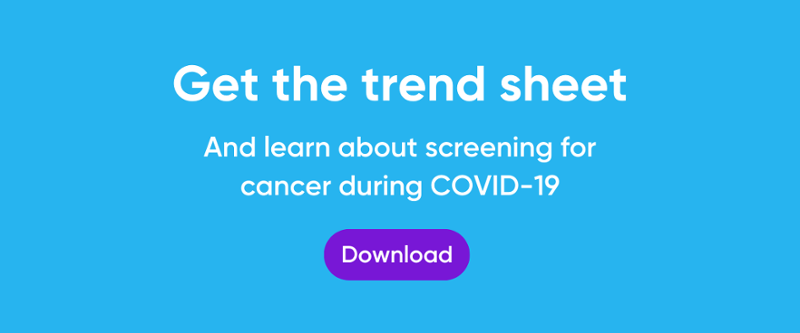Routine screenings for cancer were down as much as 94% compared to the previous average.1
Delaying your cancer screening? While it‘s true you should postpone any clinic visits you can to conserve health system resources and reduce patient contact during COVID-19,2 be cautious. Self-exams and physical vigilance may work for the time-being, but the high potential risk of delays is the diagnosis of a more-advanced cancer. To ensure you still critically detect cancer early, it’s crucial to understand which screenings you should—or shouldn‘t—postpone.
When to call your doctor for support
Telehealth may be the best option if you’re a:
-
Survivor who has completed treatment and now shown symptoms
-
Low-risk patient taking hormonal or oral chemotherapy
When it might be okay to delay
Ask yourself, does your risk of developing cancer outweigh your chances of getting COVID-19? If you’re healthy with no symptoms and no risk factors, you can likely defer elective screenings such as mammograms and colonoscopies.2
Staying safely at home, consider these alternatives for early cancer detection and ask your physician if they might be right for you:
-
At-home colon cancer tests – the fecal occult blood test and the fecal DNA test that collect a stool sample to be sent to a lab
-
Skin cancer self-exams – monthly checks conducted by you of easy-to-see places and a family member or friend for harder-to-view sites such as your scalp, back, and backsides of the ears
→ Get the trend sheet: Screening for cancer during COVID-19 [Download Now]
When you shouldn’t wait
Seriously consider getting screened by your physician if you notice:
-
New skin lesions that grow in size or don’t disappear, changes to existing lesions, or a severe rash—these may be signs of skin cancer
-
A new lump or mass in your breast, bloody discharge from the nipple, or changes in breast skin such as redness—these could be signs of breast cancer
-
Changes in bowel habits, including blood in the stool—this may be a symptom of colon cancer
-
A new or increasing cough, shortness of breath, or excessive fatigue—these are possible symptoms of lung cancer
Try to maintain your screening schedule if you’ve:
-
Received a diagnosis or developed a condition that may increase your risk for cancer, such as myelodysplastic syndrome, inflammatory bowel disease, or polyps
-
Determined any family history of cancers
-
Found a known genetic mutation
-
Received an abnormal screening in the past
Last updated February 18, 2021
References
1 Printz C. Cancer screenings decline significantly during pandemic. Cancer. 2020;126(17):3894-3895.
2 Uzzo RG, Kutikov A, Geynisman DM. Coronavirus disease 2019 (COVID-19): Cancer screening, diagnosis, treatment, and posttreatment surveillance in uninfected patients during the pandemic. UpToDate. 2020.
